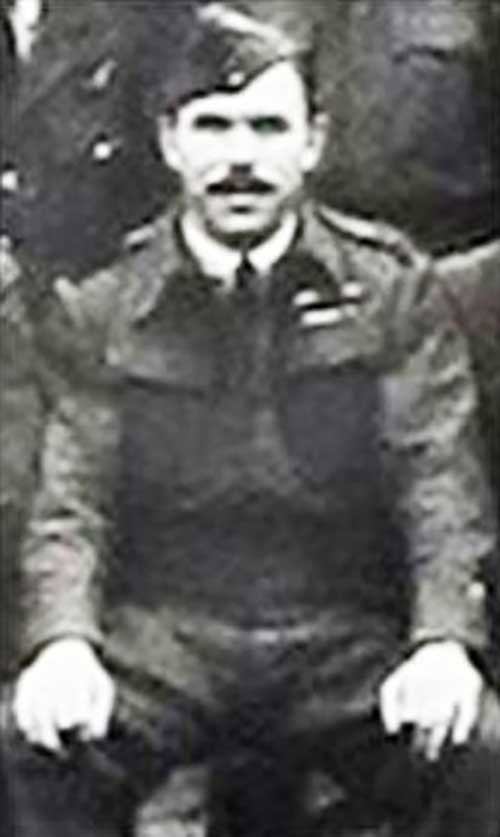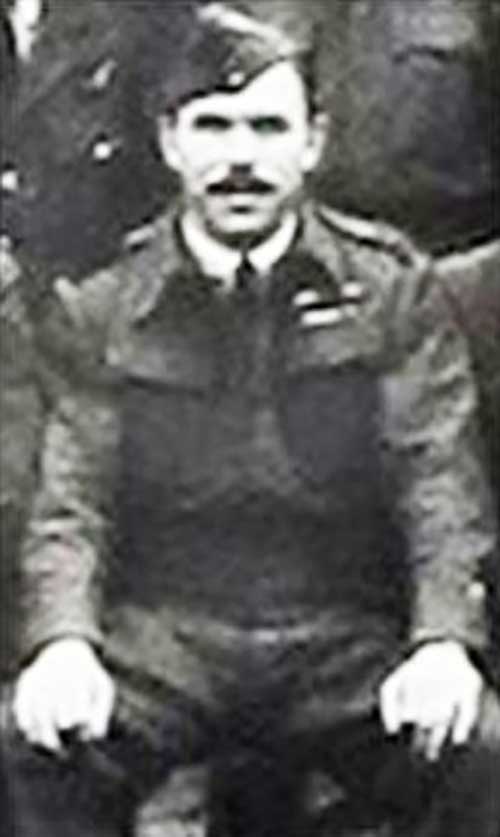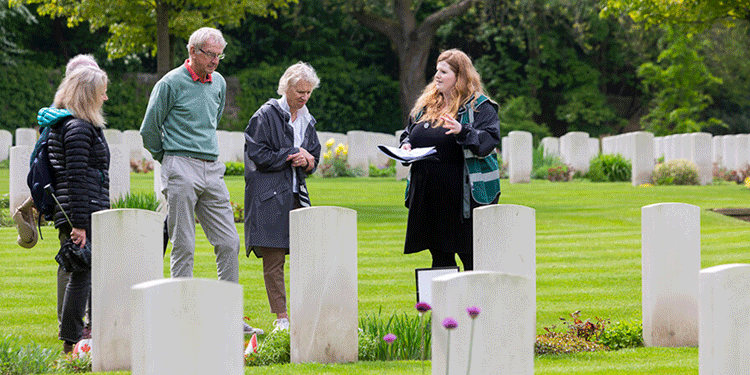
Basil Vernon Robinson was born in 1912 in Gateshead, Tyne and Wear, England to Samuel and Eileen Robinson. His father was a General Medical Practitioner and Gateshead Borough Police surgeon. His older sister Marjorie had died in infancy, and he had two younger sisters Sheila and Moyra.
He attended a prep school in Harrogate and went on to the Royal Grammar School, Gateshead between 1925-27.
Basil joined the Royal Navy, leaving in 1929, then the Royal Air Force in 1933 as a Probationary Acting Pilot. He was confirmed as a Pilot Officer on 1 September 1934 after training at No.3 Flying Training School.
He enjoyed playing rugby and played for the RAF, his home county, Bath and Somerset and North Durham. He was promoted to Flight Lieutenant in 1938 and in 1940, he was made a Squadron Leader.
He was in command of No.78 Squadron flying Armstong Whitworth Whitley heavy bombers from RAF Middleton St. George, County Durham when he was awarded his first Distinguished Flying Cross, the citation in the London Gazette on 18 July 1941 read:
"The above named officer, since he has been in command of No. 78 Squadron during his stay at this station, has at all times displayed exceptional skill and determination in pressing home his attacks in spite of hostile opposition. His fine example and keenness have been an inspiration to his junior officers. Even during the move of his squadron he still maintained its' operational effectiveness. The following report has been received from his last Commanding officer: "He has always shown outstanding keenness to fly, and has produced some very good results. On one occasion he came down to 1,000 feet in a snow storm to light up the target at Merignac (Bordeaux). He got it in his third attempt in spite of heavy flak".
On 9 September 1941, he was promoted to Wing Commander and joined 35 Squadron equipped with Handley Page Halifax heavy bombers at Linton-on-Ouse, North Yorkshire. He received the Distinguished Service Order for his actions on 18 December 1941 during an attack on the Scharnhorst and Gneisenau battleships, the citation reading:
"Wing Commander B.V. Robinson, DFC, was the captain and leader of a formation of six Halifax aircraft of No.35 Squadron which attacked the German ships Gneisenau and Scharnhorst at Brest during the daylight of 18th December 1941. By virtue of the fact that his squadron was to lead the Halifax aircraft of two other squadrons onto the target he was in reality the leader of all the Halifax aircraft. The success or otherwise of the operation, therefore, depended very largely upon this officer's leadership. That it was a most successful operation there can be no doubt. Despite intense opposition from the ground defences, with the utmost courage and determination he led the formation over the target in perfect formation and hits were seen on both ships. The words of his bomb aimer best describe his actions: "He never wavered despite the fact that flak was bursting all around us and the run-up to the target was a bomb-aimer's dream". His aircraft was hit by anti-aircraft fire several times, and he was eventually forced to land in the English Channel where he was picked up by a launch. His leadership both before and during the operation was nothing less than magnificent and for this, and for the gallantry with which he pressed home the attack, in the face of intense anti-aircraft fire, he is very strongly recommended for the award of the Distinguished Service Order."
Basil became commander of 35 Squadron in March 1942, the squadron becoming an elite Pathfinder unit in August that year and based at RAF Graveley, Cambridgeshire. He received a Bar to his DFC for his actions on a raid on Turin, Italy on the night of 18/19 November 1942, the recommendation read:
"Whilst captain of Halifax aircraft number DT488 on the night of 18th/19th November 1942, Wing Commander Robinson displayed great gallantry and tenacity in dealing with an extremely vicious aircraft fire. This fire was caused by a bundle of three reconnaissance flares failing to release properly over the target area and consequently becoming armed due to the draft in the bomb bay. The violent fire thereby caused filled the fuselage and cockpit with flames and smoke. The extent and intensity of the fire appeared to indicate that there was no hope whatever of keeping the flames under control. Wing Commander Robinson therefore, after due deliberation, was forced to order the crew to abandon aircraft. He then prepared to abandon the aircraft himself and was about to do so when the fire burnt itself out. He therefore continued alone and successfully conducted his large four-engine aircraft over the 600 miles journey to England where he landed successfully in very poor conditions. This journey included a crossing of the Alps and many hundreds of miles over enemy occupied territory. For this most praiseworthy and successful flying feat I strongly recommend Wing Commander Robinson for the immediate award of a Bar to the Distinguished Flying Cross."
He then became Chief Instructor at No.19 operational Training Unit for which h received the Air Force Cross, his citation reading:
"Wing Commander Robinson has been employed as Chief Instructor to No.19 Operational Training Unit for the past eight months, following a distinguished tour of operational duty. By his untiring efforts and meticulous attention to detail, he has raised the standard of this unit to a high degree of efficiency. He has at all times set an outstanding example. This officer has now returned to operations in command of his old squadron."
Returning to 35 Squadron at Graveley in May 1943 as Station Commander, he would fly with crews on ops and was in Halifax HR928 on a raid over Berlin on 23 July 1943 when it was shot down by a night fighter killing all on board.
The crew were buried in Wensickendorf Cemetery, Germany and post war were reburied in the Berlin 1939-1945 War Cemetery on 111 April 1947.
Basil was buried in plot 5.L.11. The crew of Halifax HR928 are buried beside him:
Flight Sergeant Dennis Burke RAF (Flight Engineer) - 5.L.8.
Pilot Officer Walter David Craig RCAF (Air Gunner) - 5.L.9.
Squadron Leader Michael Charles Xavier Mack RAF(AuxAF) (Navigator) - 5.L.10. Flight
Lieutenant Harry Webster RAFVR (Pilot), Pilot Officer William Philip Macdonald McIntosh RCAF (Air Bomber), Pilot Officer Robert William Nixon RCAF (Wireless Operator), Warrant Officer Class II Osborne Lloyd Bliss RCAF (Air Gunner) - Collective grave 5.L.12-15


